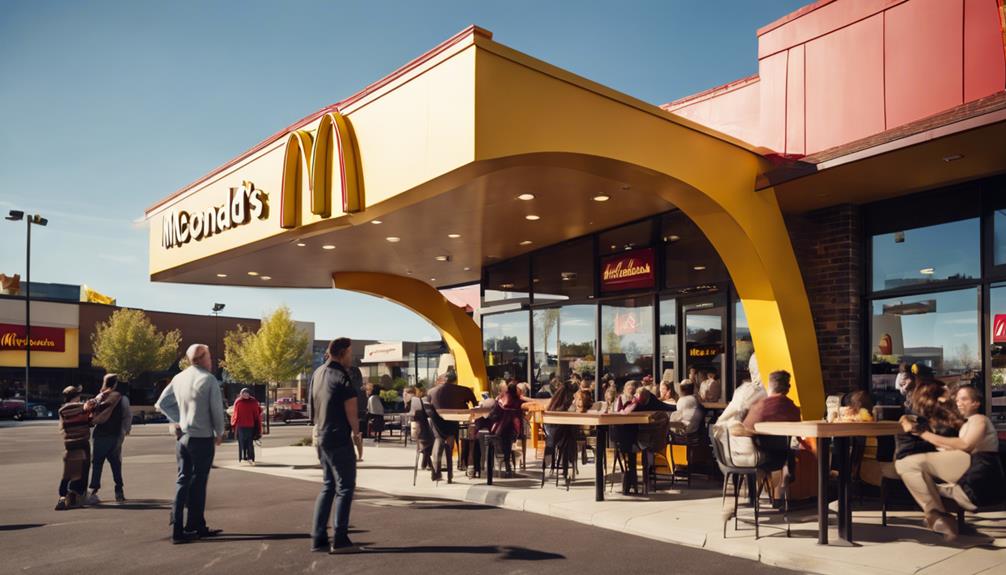Joining the McDonald's franchise revolution presents a dynamic opportunity for aspiring entrepreneurs. With over 40,801 locations worldwide, McDonald's boasts a proven business model that combines extensive training and ongoing support. Franchisees benefit from a globally recognized brand and the backing of a robust operational network, ensuring consistent customer experiences. The initial investment ranges from $1 million to $2.5 million, but financing options are available to ease the burden. As McDonald's adapts to market trends with innovative offerings, entrepreneurs can capitalize on a strong market presence. There's much more to explore about becoming a franchisee within this iconic brand.
Key Elements

In exploring the key elements of McDonald's franchise model, one finds a robust company overview that highlights its extensive history and global presence.
The business overview reveals the structured support and resources provided to franchisees, ensuring their success in a competitive market.
Additionally, important information for potential franchisees outlines the financial requirements and training programs that set them up for long-term growth.
Company Overview
McDonald's stands as a global leader in the fast-food industry, renowned for its iconic branding and a proven franchise model that has enabled extensive growth across more than 100 countries.
Founded in the 1940s by Dick and Mac McDonald, it revolutionized quick-service dining with a streamlined menu.
Ray Kroc's involvement in the 1950s catalyzed the franchise's expansion, resulting in over 40,801 locations worldwide as of 2023.
McDonald's offers franchisees significant advantages, including global brand recognition, established operational support, and thorough training programs.
This combination of factors not only attracts investors but also guarantees a consistent customer experience, making McDonald's a highly sought-after franchise opportunity for aspiring entrepreneurs looking to join a successful global brand.
Business Overview
Offering a diverse menu and a commitment to quality service, the franchise model thrives on efficiency and customer satisfaction as key elements of its business strategy.
McDonald's stands out with its iconic branding and streamlined operations, which have evolved since its inception in the 1940s.
The franchise capitalizes on global brand recognition, providing franchisees with a proven business model, extensive training, and operational support.
Franchise locations benefit from established marketing strategies and a focus on community engagement, enhancing customer loyalty.
Additionally, McDonald's actively adapts to market trends, integrating health-conscious options and sustainability initiatives.
Combining these factors, the franchise remains a leader in the fast-food industry, attracting motivated individuals who seek long-term success in a dynamic market.
Information for Franchisees
Franchisees often benefit from a thorough support system that includes extensive training, operational guidance, and marketing assistance.
McDonald's provides an all-encompassing training program that covers restaurant operations, performance enhancement, and management skills. This training involves an online curriculum and a commitment of 20 hours weekly, ensuring franchisees are well-prepared before opening.
Ongoing support continues post-launch, with resources for marketing, operations, and management. Franchisees also gain access to proprietary systems for inventory and supply chain management.
Additionally, McDonald's encourages community engagement through initiatives, fostering brand loyalty and local presence.
With options for absentee ownership and exclusive territories, franchisees can adapt their business strategies to meet market demands, paving the way for long-term success and legacy building.
Company Overview

McDonald's was founded by Dick and Mac McDonald, who prioritized quality service from the start.
The company's executive team and management structure have evolved to enhance operational efficiency and support franchisees.
Analyzing the franchise market share reveals McDonald's dominant position in the fast-food industry, reflecting its successful business model.
Founders: Dick and Mac McDonald
The visionary brothers, Dick and Mac McDonald, revolutionized the fast-food industry in the 1940s by creating a streamlined operation that prioritized efficiency and simplicity in their menu.
They opened their first restaurant in San Bernardino, California, where they introduced the “Speedee Service System,” focusing on quick preparation and service. This innovative approach allowed them to serve high-quality burgers, fries, and shakes at unprecedented speeds.
Their branding, featuring bold yellow and red colors alongside the iconic golden arches, quickly became recognizable.
The McDonald brothers laid the foundation for a global franchise model, ultimately attracting Ray Kroc, who expanded their vision.
Today, McDonald's stands as a demonstration of their groundbreaking ideas and commitment to operational excellence.
Commitment to Quality Service
With a steadfast dedication to quality service, McDonald's guarantees that every customer experience reflects its commitment to excellence and efficiency.
The franchise prioritizes a consistent and reliable service model, ensuring that customers receive their orders promptly and accurately, no matter the location.
McDonald's invests heavily in staff training, equipping employees with the skills necessary to uphold high service standards.
This focus on quality extends to food preparation and cleanliness, creating a welcoming environment for diners.
Furthermore, regular feedback from customers helps the franchise continually refine its service approach.
Executive Team and Management Structure
Led by a diverse executive team, McDonald's employs a strategic management structure that fosters innovation and responsiveness in the competitive fast-food landscape. This team consists of seasoned professionals with extensive industry experience, ensuring effective decision-making and operational excellence.
The management structure emphasizes collaboration and communication across various departments, facilitating rapid adaptation to market trends and consumer preferences. By prioritizing employee development and engagement, McDonald's cultivates a culture of accountability and high performance.
This approach not only enhances internal operations but also strengthens the franchise's brand reputation. With a commitment to transparency and ethical practices, McDonald's leadership guides the company towards sustainable growth while supporting franchisees in their business endeavors, thereby maintaining its position as a global industry leader.
Franchise Market Share Analysis
McDonald's commands a significant share of the global fast-food market, positioning itself as a leader in both sales and brand recognition. With over 40,801 locations in more than 100 countries, it consistently ranks among the top franchises worldwide.
The company's successful business model revolves around a diverse menu catering to evolving consumer preferences, including health-conscious options. McDonald's has also embraced technological advancements, such as mobile ordering, enhancing customer convenience.
Its impressive accolades, including high rankings in the Franchise 500, reflect its strong market presence. As the fast-food industry grows, McDonald's remains poised for continued success, attracting motivated franchisees enthusiastic to join a well-established brand with a proven track record.
Brand Identity
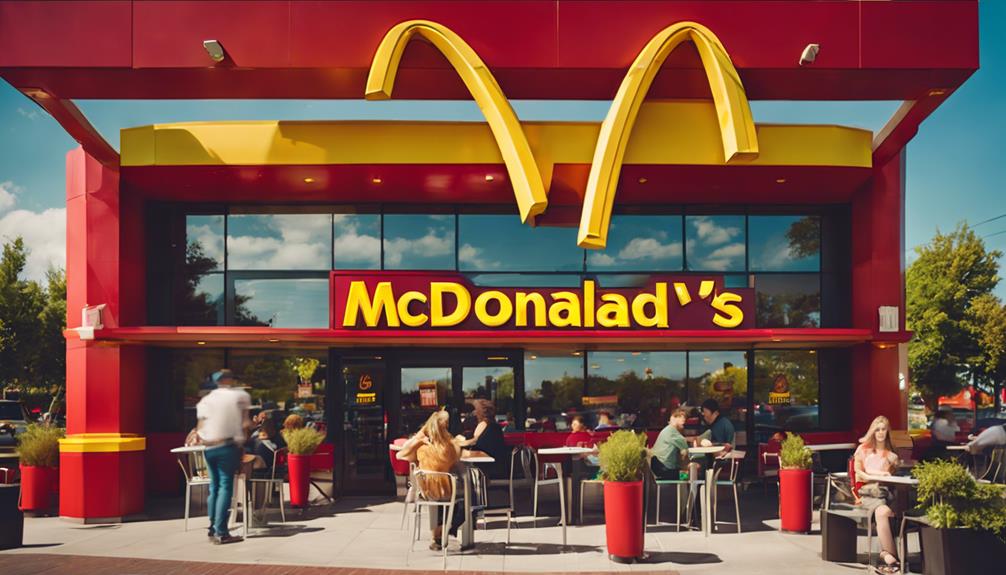
McDonald's brand identity is unmistakably global, marked by its iconic golden arches and commitment to customer satisfaction.
The franchise supports its owners with a robust network, ensuring they've the resources to maintain high standards.
This combination of visibility, customer focus, and franchisee support solidifies McDonald's position as a leader in the fast-food industry.
Global Brand Visibility
The golden arches symbolize a commitment to quality and consistency, making the franchise instantly recognizable across the globe.
McDonald's has mastered the art of global brand visibility, ensuring that its iconic logo, colors, and messaging resonate in diverse markets.
Through strategic marketing campaigns and localized menu offerings, the franchise maintains relevance while staying true to its core identity.
This adaptability allows McDonald's to connect with customers on a personal level, enhancing brand loyalty.
Franchise owners benefit from this established visibility, drawing in a steady stream of customers keen for familiar favorites.
In a competitive industry, McDonald's brand presence stands as proof of its enduring appeal, making it a top choice for aspiring franchisees worldwide.
Commitment to Customer Satisfaction
A strong commitment to customer satisfaction defines the brand identity of this global franchise, ensuring that each dining experience meets or exceeds expectations.
McDonald's prioritizes listening to customer feedback, continuously refining its menu and services based on consumer preferences and trends.
The franchise maintains high operational standards, ensuring cleanliness and quality in every location. Employees receive training focused on delivering exceptional service, fostering a welcoming atmosphere.
This dedication to satisfaction isn't just about food; it's about creating memorable experiences for every guest.
Strong Franchisee Support Network
Franchisees benefit from a robust support network that empowers them to thrive in a competitive market.
McDonald's offers thorough training programs, ensuring franchisees are well-prepared to manage their restaurants effectively. With access to experienced trainers, they receive ongoing operational support and marketing guidance, which helps maximize performance.
Franchisees also utilize proprietary systems for inventory and supply chain management, streamlining daily operations.
Additionally, McDonald's fosters community engagement initiatives, allowing franchise owners to build strong local connections. This collaborative environment not only enhances brand identity but also encourages franchisees to adapt to market trends.
Ultimately, the extensive support network cultivates a sense of belonging among franchisees, driving their success and reinforcing McDonald's renowned global brand.
Information for Franchisees

For those considering joining McDonald's, understanding the support and resources available is essential to achieving success in this iconic franchise.
McDonald's provides extensive training programs, covering everything from restaurant operations to multi-restaurant management. New franchisees benefit from a self-paced online curriculum and hands-on training with experienced trainers.
Ongoing operational support includes access to proprietary inventory systems, marketing strategies, and management assistance. Franchise owners also engage in community initiatives, fostering local ties and enhancing brand image.
With options for absentee ownership and exclusive territories, McDonald's accommodates various ownership styles. This robust support network empowers franchisees to navigate challenges effectively and thrive within a dynamic market, ensuring their journey with McDonald's is both rewarding and sustainable.
Financial Requirements & Ongoing Fees
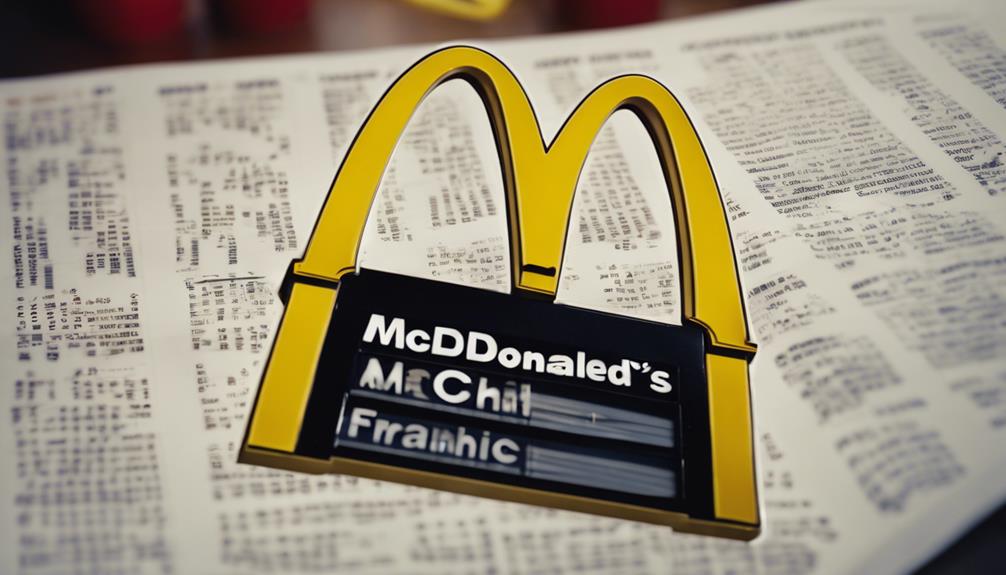
When considering a McDonald's franchise, potential owners face significant financial requirements.
An initial investment can range from $1 million to $2.5 million, alongside a $45,000 franchise fee.
Additionally, ongoing fees include a percentage of gross revenue and contributions toward marketing efforts, ensuring franchisees remain aligned with the brand's goals.
1 Million Minimum Investment
Investing in a McDonald's franchise requires a minimum cash outlay of $500,000, alongside an overall initial investment that can range between $1,008,000 and $2,503,000. This substantial financial commitment reflects the brand's established reputation and the extensive support franchisees receive.
The initial franchise fee is set at $45,000, while ongoing royalty fees typically consist of a percentage of gross sales. Additionally, franchisees contribute to an advertising royalty fee starting at 4%.
With franchise terms lasting up to 20 years, potential owners should carefully assess their financial situation, reviewing legal documents and consulting with professionals. These steps guarantee long-term viability and success within the fast-food industry, making McDonald's a compelling investment opportunity.
45,000 Initial Franchise Cost
Understanding the initial franchise cost is vital for potential McDonald's franchisees, as it encompasses both the upfront financial commitment and ongoing fees that contribute to the overall investment.
The initial investment ranges from $1,008,000 to $2,503,000, with a minimum cash requirement of $500,000, ensuring that franchisees are financially prepared. Franchisees must also pay an initial franchise fee of $45,000.
Ongoing royalty fees typically include a percentage of gross sales, while an advertising royalty fee starts at 4%.
It's essential for aspiring owners to review legal documents and consult with professionals like attorneys and accountants to assess the viability of their investment, ensuring they make informed decisions before joining the McDonald's franchise network.
Percentage of Gross Revenue
Ongoing fees for McDonald's franchisees include a royalty percentage based on gross sales, which typically begins at 4%. This royalty fee is vital for maintaining the brand's operational support and marketing initiatives.
Franchisees need to budget for these fees as part of their overall financial planning. Additionally, they must be prepared for a range of costs associated with running their restaurants, including staffing, supplies, and local operational expenses.
The financial structure is designed to guarantee franchisees benefit from McDonald's extensive market presence and brand loyalty while contributing to the collective success of the franchise.
Understanding these ongoing fees helps potential franchisees make informed decisions about their investment in McDonald's.
% Marketing Contribution
Franchisees contribute to a marketing fund, which starts at 4% of their gross sales, ensuring they benefit from McDonald's extensive advertising and promotional efforts. This contribution is vital for maintaining brand visibility and attracting customers through national campaigns.
In addition to the marketing fund, franchisees should also be aware of the initial investment, which can range from $1,008,000 to $2,503,000, along with a $45,000 franchise fee.
Ongoing royalty fees, typically a percentage of gross sales, are fundamental for sustaining the franchise's operations and support systems.
Maintenance and Equipment Fees
Maintenance and equipment fees are fundamental components of a McDonald's franchise's financial obligations, guaranteeing that the restaurant operates efficiently and meets the brand's high standards.
Franchisees must budget for ongoing maintenance costs, which can include regular repairs, equipment upgrades, and routine inspections. These fees help maintain the integrity of the restaurant's operations and uphold the McDonald's reputation.
Additionally, franchisees are responsible for investing in state-of-the-art kitchen equipment that aligns with McDonald's operational guidelines. This commitment to quality and functionality is critical for delivering the fast, reliable service customers expect.
Financing Options
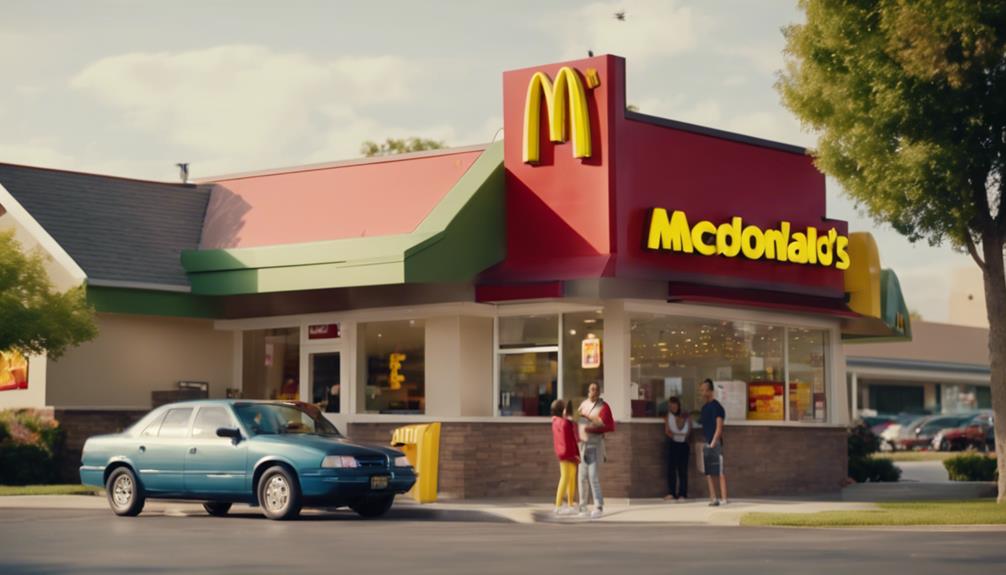
When considering a McDonald's franchise, potential owners have various financing options at their disposal.
In-house financing can ease the initial investment burden, while alternative funding sources offer additional flexibility.
Government-backed loan providers also present opportunities for franchisees to secure the necessary capital for a successful start.
In-House Financing Options Available
While exploring options to finance a McDonald's franchise, potential owners can benefit from in-house financing solutions that streamline the investment process.
McDonald's offers tailored financing programs designed to assist franchisees in managing their startup costs effectively. These options may include flexible payment plans and lower interest rates, making the financial commitment more accessible.
Additionally, in-house financing can reduce the time required for loan approvals, allowing franchisees to focus on launching their restaurants sooner. By utilizing these financing solutions, prospective owners can align their financial goals with the support McDonald's provides, ensuring a smoother shift into franchise ownership.
This practical approach enhances the overall franchise experience and fosters a strong partnership with the brand.
Alternative Funding Sources Available
Exploring alternative funding sources can provide prospective McDonald's franchisees with additional financial options beyond in-house financing.
Many franchisees tap into personal savings, family loans, or crowdfunding platforms to gather the necessary capital.
Additionally, some entrepreneurs seek private investors who are interested in partnering on the venture, sharing both risks and rewards.
Credit unions and community banks often offer tailored loan products that can be more flexible than traditional banks.
Franchisees might also consider leveraging assets or obtaining lines of credit to cover startup costs.
Government-Backed Loan Providers
Government-backed loan providers offer franchisees a reliable avenue for financing their McDonald's venture, helping to alleviate some of the financial burdens associated with startup costs.
These programs, often backed by the Small Business Administration (SBA), provide lower interest rates and longer repayment terms compared to traditional loans.
Franchisees can access funds for initial investments, equipment purchases, and working capital, making it easier to launch and sustain their business.
Additionally, these loans often require less collateral, making them an attractive option for new entrepreneurs.
Training & Support Offered

McDonald's provides franchisees with a thorough onboarding curriculum that equips them with essential skills before opening their doors.
Continuous skills enhancement programs guarantee that owners stay updated on best practices and operational innovations.
Additionally, the franchise offers robust operational guidance and tools, making it easier for franchisees to manage their restaurants effectively.
Comprehensive Onboarding Curriculum
The thorough onboarding curriculum for franchisees combines an extensive training program with ongoing operational support, ensuring each owner is well-equipped to succeed in running their restaurant.
Franchisees engage in a self-paced online curriculum, dedicating around 20 hours weekly to mastering essential skills. The training covers restaurant operations, performance maximization, and multi-location management, with guidance from seasoned trainers.
After opening, franchisees benefit from continuous support, including marketing strategies, operational assistance, and access to exclusive inventory management systems. Regular updates on menu items and promotions keep owners informed and competitive.
This all-encompassing approach not only prepares franchisees for immediate challenges but also fosters long-term growth and success in the dynamic fast-food industry.
Continuous Skills Enhancement Programs
Franchisees benefit from continuous skills enhancement programs designed to keep their operations sharp and competitive in the evolving fast-food landscape.
These programs provide franchise owners with ongoing training that focuses on the latest industry trends, customer service excellence, and efficient operational practices.
McDonald's offers various workshops, webinars, and seminars, ensuring franchisees stay ahead of market demands.
Additionally, they receive access to a wealth of resources, including updated training materials and best practices from successful peers.
This commitment to skills enhancement not only boosts individual franchisee performance but also contributes to the overall strength of the McDonald's brand.
Operational Guidance and Tools
Thorough training and support systems equip new franchise owners with the tools they need to thrive in the competitive fast-food market.
McDonald's offers an extensive training program before opening, which includes a self-paced online curriculum and a commitment of 20 hours per week. This training focuses on restaurant operations, performance maximization, and multi-restaurant management, delivered by experienced trainers.
Ongoing support encompasses marketing, operations, and management assistance, alongside access to proprietary inventory and supply chain systems. Franchisees benefit from regular updates on menu items and promotions, ensuring they're always informed.
Additionally, McDonald's allows for absentee ownership and part-time operation, making it easier for owners to manage their businesses effectively while maintaining exclusive territories.
LEGAL AND REGULATORY

In the domain of franchising, legal and regulatory compliance plays an essential role in maintaining brand integrity and operational success.
McDonald's provides franchisees with an extensive legal compliance guide to navigate the complexities of franchise laws and regulations.
This support guarantees that owners adhere to all necessary legal standards while running their businesses effectively.
Franchise Legal Compliance Guide
In the domain of franchising, legal compliance is essential for McDonald's franchisees.
They must familiarize themselves with key sections of the franchise agreement and understand their legal obligations to guarantee smooth operations.
Complying with these regulations not only protects franchisees but also strengthens the overall brand integrity.
Key Sections to Review
Understanding the legal and regulatory landscape is essential for McDonald's franchisees to secure compliance and protect their investment.
Franchisees should focus on key sections of the Franchise Disclosure Document (FDD), including franchise fees, operational obligations, and termination clauses.
Familiarity with these elements guarantees franchisees can navigate their responsibilities effectively, minimizing legal risks and fostering a successful business relationship with McDonald's.
Legal Obligations
Franchisees must adhere to various legal obligations to maintain compliance and safeguard their investment in the McDonald's brand.
They're required to understand and follow franchise agreements, guarantee proper licensing, and comply with health and safety regulations.
Additionally, staying informed about local laws and industry standards is essential.
Non-compliance can result in penalties, affecting both operations and long-term profitability within the franchise system.
MARKET ANALYSIS

The fast food market continues to show robust growth, fueled by rising demand for convenience among consumers.
Millennials and Gen Z are leading this trend, prioritizing quick service and innovative menu options that align with their lifestyle.
As McDonald's adapts to these preferences, it reinforces its position as a key player in the evolving landscape of the franchise industry.
Fast Food Market Growth
The fast food market is experiencing a significant surge in demand, driven by consumers' desire for convenience and quick service.
Projections indicate robust growth rates through 2024, highlighting the industry's resilience and adaptability.
As market dynamics evolve, franchises like McDonald's are well-positioned to capitalize on these trends and expand their reach.
Fast Food Demand Surge
Driven by busy lifestyles and a growing preference for convenience, fast food demand has surged considerably in recent years.
Consumers increasingly seek quick, accessible meal options, which has propelled the industry's growth.
This shift not only benefits established chains like McDonald's but also presents aspiring franchisees with lucrative opportunities.
The evolving market landscape underscores the potential for sustained success in the fast food sector.
Projected Market Growth Rates
Projected market growth rates for the fast food industry indicate a robust expansion, fueled by rising consumer demand for convenient dining options and innovative technology integration.
Analysts expect steady growth through 2024, with an increasing focus on health-conscious offerings and sustainability.
This environment presents significant opportunities for McDonald's franchisees, as the brand adapts to evolving consumer preferences and market dynamics.
Millennials and Gen Z Preferences
Millennials and Gen Z are reshaping the fast-food landscape with their unique preferences and consumer behaviors.
They prioritize convenience, sustainability, and health-conscious options, influencing brands to adapt their offerings.
Understanding these generational trends is essential for McDonald's to maintain its competitive edge and engage younger audiences effectively.
Millennial and Gen Z Preferences
Embracing new dining trends, both Millennials and Gen Z consumers prioritize convenience, sustainability, and health-conscious options in their food choices.
They favor brands that align with their values, opting for transparent sourcing and eco-friendly practices.
Additionally, these demographics appreciate digital engagement through apps and social media, making it essential for franchises like McDonald's to adapt their strategies to meet these evolving preferences.
Consumer Behavior Trends
Consumer preferences are shifting rapidly, with younger generations increasingly demanding convenience, sustainability, and healthier food options from their favorite brands.
Millennials and Gen Z prioritize transparency, often favoring brands that actively engage in ethical practices.
They also expect technology integration, such as mobile ordering and delivery services, making it essential for franchises like McDonald's to adapt to these evolving consumer behaviors for continued success.
EXIT STRATEGY

When franchisees consider their exit strategy, McDonald's offers a Franchise Buyback Program that simplifies the process of selling their business.
Additionally, understanding the franchise transfer guidelines and processes is essential for ensuring a smooth shift.
These components allow owners to navigate their exit with confidence, maintaining the integrity of the franchise brand.
Franchise Buyback Program
The Franchise Buyback Program offers owners a strategic exit option, allowing them to sell their McDonald's locations back to the corporation under specific conditions.
This program provides a seamless way for franchisees to shift out of their business while ensuring brand continuity.
Franchise owners can take advantage of this program when they meet certain criteria, including performance metrics and operational standards.
By participating, they can enjoy a hassle-free process, receiving fair market value for their investment.
This buyback initiative not only helps franchisees exit gracefully but also strengthens McDonald's brand by maintaining quality control.
Ultimately, it serves as a valuable tool for franchise owners considering their long-term plans and financial security.
Franchise Transfer Guidelines and Processes
Guiding the franchise transfer process requires careful planning and adherence to McDonald's established guidelines to guarantee a smooth shift for both the outgoing and incoming owners.
Franchisees must notify McDonald's of their intention to transfer, providing necessary documentation and details about the prospective buyer. The incoming franchisee must meet McDonald's financial and operational standards, undergoing a thorough review process.
Training may be required to guarantee familiarity with McDonald's systems and procedures. Additionally, the outgoing owner must fulfill any outstanding obligations, such as royalty payments.
Once all conditions are met, McDonald's approves the transfer, facilitating a seamless handover. This strategic exit plan helps maintain brand integrity while supporting franchisees in their shift.
ADDITIONAL RESOURCES
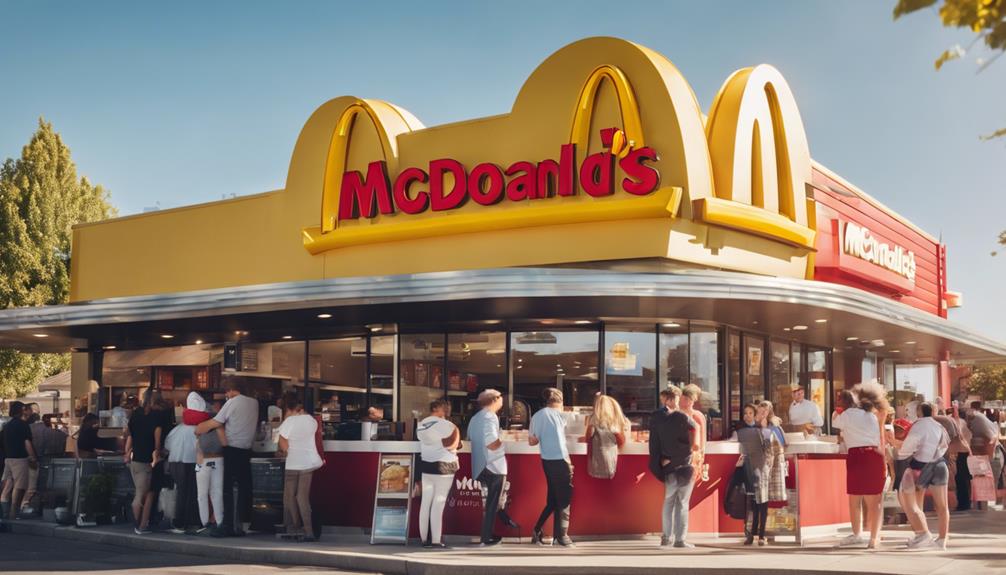
In exploring additional resources for McDonald's franchisees, it's crucial to highlight franchisee success stories that inspire potential owners.
They can also utilize a dedicated franchise inquiry email address for direct communication and queries.
Moreover, networking opportunities abound, allowing franchisees to connect and learn from one another, fostering a supportive community.
Franchisee Success Stories
Often, franchisees find remarkable success by leveraging McDonald's robust training programs and community engagement initiatives.
For instance, one franchisee in Texas saw a 25% increase in sales after implementing local marketing strategies learned during training.
Another franchisee in California built a loyal customer base through participation in Ronald McDonald House events, enhancing their brand presence in the community.
These success stories highlight how franchisees utilize McDonald's resources to foster growth and build strong local connections.
Franchise Inquiry Email Address
For those interested in exploring McDonald's franchise opportunities, the dedicated franchise inquiry email address provides a direct line for questions and information requests.
Prospective franchisees can reach out to gather essential details about the application process, financial requirements, and training programs. This email address serves as a valuable resource for individuals seeking clarity on any uncertainties they might have.
By utilizing this communication channel, aspiring owners can receive timely and accurate responses directly from the McDonald's franchise support team. It's an efficient way to kickstart their journey toward becoming a part of the iconic brand.
Engaging with the franchise inquiry email guarantees that potential franchisees are well-informed and prepared for the next steps.
Franchise Networking Opportunities
Franchise networking opportunities play a crucial role in connecting McDonald's franchisees with each other and the corporate team, fostering collaboration and sharing of best practices.
These platforms allow franchisees to exchange insights on operational efficiency, marketing strategies, and customer service enhancements.
Regular franchisee meetings and conferences create an environment for learning and growth, enabling franchisees to build relationships that can lead to mentorship and support.
Additionally, online forums and social media groups provide continuous engagement, allowing members to discuss emerging trends and challenges.
Conclusion
To sum up, joining the McDonald's franchise revolution offers aspiring entrepreneurs a unique opportunity to be part of a globally recognized brand with a proven business model. By becoming a McDonald’s franchisee, individuals can tap into the extensive support and resources provided by the company, setting them up for lasting investment success. From comprehensive training programs to ongoing marketing and operational support, franchisees have the tools they need to thrive in the competitive fast-food industry. With a strong track record of success and a loyal customer base, joining the McDonald’s franchise revolution is a strategic move for entrepreneurs seeking a lucrative and stable business opportunity.
With extensive training and support, franchisees can thrive in the fast-food industry while contributing to community engagement and sustainability.
As the market continues to expand, those ready to embrace this journey can look forward to a rewarding experience filled with potential for growth and success.
